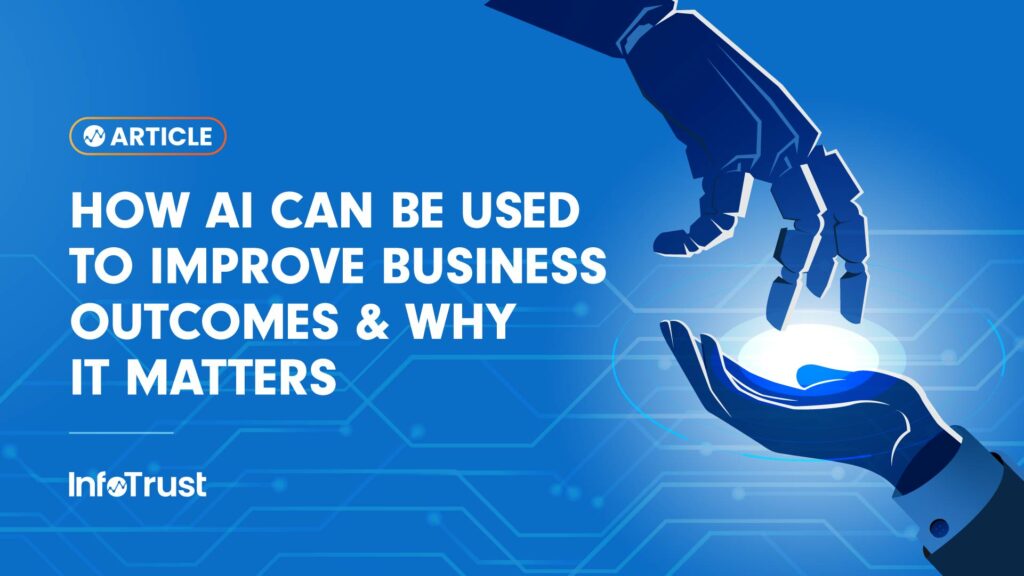In this digital age, it’s more important to make the most of your data and stay ahead of the competition. With AI becoming an increasingly popular option for businesses hoping to improve their outcomes, it’s essential to understand how AI can improve business performance and success. In this blog post, we’ll discuss what AI is and how to use it to boost measurable outcomes like website visits, revenue growth, customer acquisition rate, and other analytics KPIs. We’ll also cover why understanding how AI works is critical for organizations that have adopted or are considering using it now or in the future. Finally, I will explain why using AI makes sense for modern marketers seeking tools that accurately measure results faster than ever before—and therefore deliver quicker insights on what works (and doesn’t work) when creating campaigns across multiple channels such as email marketing, social media ads, print ads, and so much more!
What is AI, and how can it be used to improve business outcomes?
AI, or artificial intelligence, is a term that has gained immense popularity in recent years. It refers to the capability of machines to emulate human intelligence and perform tasks that require a level of cognitive ability. One of the most exciting applications of AI in business is using predictive analytics and other AI tools in digital analytics. By leveraging these tools, companies can gain valuable insights into their customers’ behavior and preferences, allowing them to optimize their strategies and improve their outcomes. For instance, companies can use predictive analytics to make more informed decisions about product development. At the same time, AI can help identify customer data patterns that might go unnoticed. Collectively, AI technologies allow businesses to stay one step ahead of the competition and deliver measurable bottom-line results.
The benefits of AI in business
AI technology is revolutionizing the way we conduct business. With predictive analytics, companies can forecast trends and identify opportunities, allowing them to make informed decisions with minimal risk. Likewise, anomaly detection can help identify potential problems before they cause severe damage. Pairing AI with advanced data visualization tools allows businesses to quickly make sense of complex data sets, ensuring they are always up-to-date with what is happening in their industry. Data science has become integral to any successful organization in the ever-evolving business world. By leveraging the power of AI, companies can gain invaluable insights into their data, streamlining processes and ultimately improving performance. The benefits of AI in business are undeniable, and those who do not embrace it risk falling behind the competition.
Examples of AI-driven businesses and how they’re succeeding
AI has brought many innovative solutions to modern-day businesses. With the advent of predictive analytics, data science, and big data, many companies have streamlined routine processes, reduced manual efforts, and increased efficiency. One such example is Netflix, the popular streaming service. By leveraging AI algorithms to analyze user data, they have been able to personalize their recommendations, making it easier for subscribers to discover new content. Similarly, Amazon is also capitalizing on AI by using predictive analytics to forecast product demand, helping them optimize their inventory and reduce waste. These companies are a small fraction of the many AI-driven businesses currently succeeding in their respective industries.
The potential risks associated with using AI in business
As AI technology advances, businesses increasingly use predictive analytics to gain a competitive edge. However, the potential risks of using AI in business, particularly in data science, should be considered. The risk of bias in AI algorithms is a significant concern, as they may make unfair, discriminatory, or inaccurate decisions based on skewed or unrepresentative data. This can have dire consequences, including perpetuating discrimination, reinforcing stereotypes, and eroding trust in AI systems. Businesses must adopt responsible AI practices, such as using diverse and representative datasets and implementing robust evaluation metrics to mitigate risks. Companies can build trust and confidence in their predictive analytics models by auditing AI models regularly for fairness and bias.
How to ensure you use AI responsibly and ethically
AI has gained immense popularity in the last decade, and its usage in businesses has become crucial for success. With the advent of predictive analytics and data-driven decision-making, companies can utilize AI to take their operations to the next level. However, the ethical use of AI has become a concern for many organizations. Businesses must examine their data and analytics use to responsibly and ethically use AI. They must establish boundaries and interpretations around data usage and ensure their AI models do not mirror existing biases or create new ones. Moreover, regularly monitoring the AI system’s behavior can help businesses identify and rectify discrepancies. By following these practices, companies can harness the power of AI while maintaining ethical and responsible practices.
The importance of investing in AI for your business success
In today’s digital age, staying ahead of the competition is crucial for businesses. Investing in AI is one way to achieve success. With predictive analytics and the ability to process large amounts of data, AI allows for accurate analysis and informed decision-making. Using AI for data analysis can reveal valuable insights into customer behavior, market trends, and potential risks. Not only does AI streamline processes and improve efficiency, but it also provides businesses with a powerful tool for advancing their success.
AI is a powerful tool that can significantly improve business outcomes and help companies keep up with the times. The most important thing to remember regarding AI in business is to use it responsibly and ethically. Companies should consider the risks associated with implementing AI solutions into their operations, such as potential misuse or data breaches, and implement proper security measures for their AI projects. Additionally, businesses should look at the bigger picture when using AI and ensure they invest in it strategically to capitalize on its full potential. Ultimately, using AI will remain a cornerstone of successful businesses for years as companies continue to innovate and seek new ways to improve customer experience or achieve greater efficiency through technology solutions like artificial intelligence.


